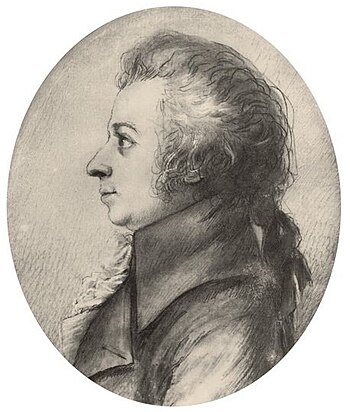 |
| Drawing of Mozart in silverpoint, made by Dora Stock during Mozart's visit to Dresden, April 1789 (Photo credit: Wikipedia) |
Mozarts Early Life
Mozart was famous as a child performer. His father was a renown musician and used to take Mozart around Europe performing. Aside from being a cute child performer, Mozart was also a great composer. He is famous for writing "Twinkle Twinkle Little Star" at the age of five.
Mozart was born in Salzburg, Austria but spent a lot of time traveling around Europe as part of his dad's way to display his son's prodigal talents.
Mozart's adulthood
Mozart died at the age of 35. He lived during what is termed as the "Classical Period" in music. Mozart lived at the height of this period during the late 1700's. He did die due to multiple illnesses which at the time were hard to pinpoint as the precise cause of death. He didn't die because of contemporary composer Salieri poising him. In fact, their rivalry was greatly exaggerated to sell movies.
Mozart could not secure long-term work throughout much of his adult life. When he moved to Vienna he especially had a hard time finding work. He was also paid poorly for his masterpieces.The location of his grave is unknown to this day because he died poor and had a poor mans burial.
He did live at the time of Beethoven and was older than Beethoven. However, historical records never confirmed if they met or not. Regardless, Beethoven looked upon Mozart's music in high regard and was greatly influenced by his works.
Mozart did get married and although he had 6 children, only 2 survived. One child became a composer, and the other child worked for the government.
The society and times of Mozart
During Mozart's life "public music" was just becoming allowed. It may be hard to believe, but in the era's gone by, music was reserved for the Church and nobility. However, musicians like Mozart still aspired to hold a "court position" preferably working for a royal family. This would enable them to hold a steady income.
Mozart worked at Salzburg court in his late teens the to early twenties but resigned in search of greater fame and travel. After a while of rejecting court position offers in his youth, he didn't get offered anything steady in his later years.
Mozart's social life
Mozart was a generous and social person. Despite his various illnesses and small appearance, he held great attention in social settings. There are rumors that his wife didn't take good care of Mozart during his illnesses and didn't help him manage his money which was something he needed help with. Mozart also owed many friends money at the time of his death.
Listening to Mozart's music
There have been recent studies suggesting that listening to Mozart's music increases a child's intelligence. In fact, any complex classical music has the ability to increase the intelligence of a child and I believe that all children have multiple intelligences anyway. Some kids just love the sport and won't really want to sit around listening to Mozart for long periods of time. Other kids, love music and love to listen to music. Some kids are inclined to do both. Scientific research cannot represent the whole population.
In terms of adult listeners, it is my goal that readers of this article appreciate the vast array of works that Mozart wrote in his short life and feel how these works encompass a variety of emotions and aspects of the Classical music style which Mozart contributed to. I hope you will be inspired to listen to Mozart's music via iTunes, CD's or YouTube and just let it flow over you. Then, to understand his music you must research about when that piece of music was written and what Mozart was going through in his life at the time he wrote that piece. At the time he wrote the piece of music Was he working for a court under luxury, or freelancing? Had he just experienced the death of another child or his parents? Was he in love or lonely? This is the KEY to feeling the expression and meaning beyond the sounds and understanding why certain Mozart pieces touch your soul the way they do.
|

No comments:
Post a Comment